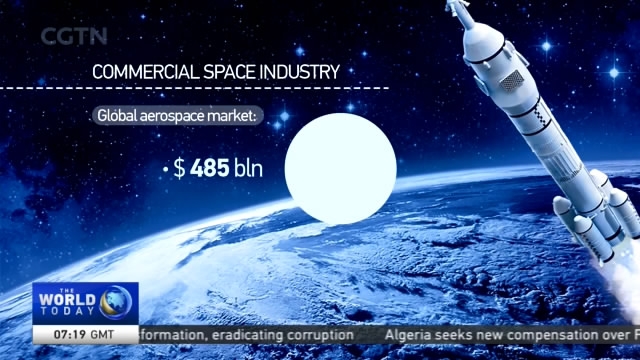
16:04, 29-Jan-2018
China Aerospace: Private sector slowly making inroads in industry

For a long time in China, "rocket science" was seen by many as a mysterious, high-tech industry that's financed by the military. But the private sector is gradually catching up and looking for its own slice of the industry. As CGTN's Zhao Yunfei tells us indeed, earlier this month, an enterprise in Beijing launched its first vertical landing rocket.
Another milestone for China, a new way of launching and landing reusable rockets.
CAI DEHUAI ENGINEER, LINK SPACE "We have now designed a technique that allows our rockets to take-off and land vertically."
Hu Zhenyu founded his start-up "Link Space" in 2014, before he had even left university, an audacious endeavor for most people, but not for this young entrepreneur.
HU ZHENYU FOUNDER, LINK SPACE "When I decided to enter this industry, I wasn't fearful, because I didn't know how tough it would be. Later I met many difficulties, I just tackled them as problems show up."
Hu's team has made a lot of progress since then. China's state-owned aerospace company hasn't invested much in this technique, not because it can't, it just feels the time isn't right. So private enterprises have been able to spot a gap in the market.
HU ZHENYU FOUNDER, LINK SPACE "The good thing about being a private company, is that our operations are separate from the traditional state system, which allow us to strategically integrate our human resources and skills. As for the supply chain, we have more flexibility to purchase devices from private companies."
ZHAO YUNFEI BEIJING "This is a vertical take-off and vertical landing rocket designed by Link Space. It's not a model, it's a real rocket. There aren't many Chinese private companies that build rockets. But four of them are here in Yizhuang. It's an Economic-Technological Development Area in south-east Beijing. A lot of aerospace talent is here, giving the companies an edge for the commercialization of the space industry."
One Space is another one of the companies in Yizhuang. It's expecting to launch its first rocket in the next few months. However, its founder says private companies can't get too romantic about the thoughts of deep space exploration.
SHU CHANG FOUNDER, ONE SPACE "We are not like the national aerospace authorities who have a lot of state-planned programs to work on. In the future, I think projects with high requirements for scientific research, such as deep space exploration, will be done by the national aerospace authorities. And for business development projects, they will be done by private companies who pay more attention to efficiency and cost."
The competition is already hotting up. By 2020, the international aerospace industry could be worth nearly half a trillion US dollars, and China will account for about a quarter of that. About two-thousand satellites will be sent into orbit in the next decade, and two-thirds of them will be for commercial use.
HU ZHENYU FOUNDER, LINK SPACE "The overall environment is good. The Chinese military allows private enterprises to get involved in the field of carrier rockets. But we still need some actual support from them."
Scientific projects and research in China require high levels of security and safety standards, which puts a strain on the finances of many private companies. Commercialization also needs to be standardized. Hu says his team has still a long way to go to be a real player in the industry, but at least its first giant step has been made. Zhao Yunfei, CGTN, Beijing.

SITEMAP
Copyright © 2018 CGTN. Beijing ICP prepared NO.16065310-3
Copyright © 2018 CGTN. Beijing ICP prepared NO.16065310-3